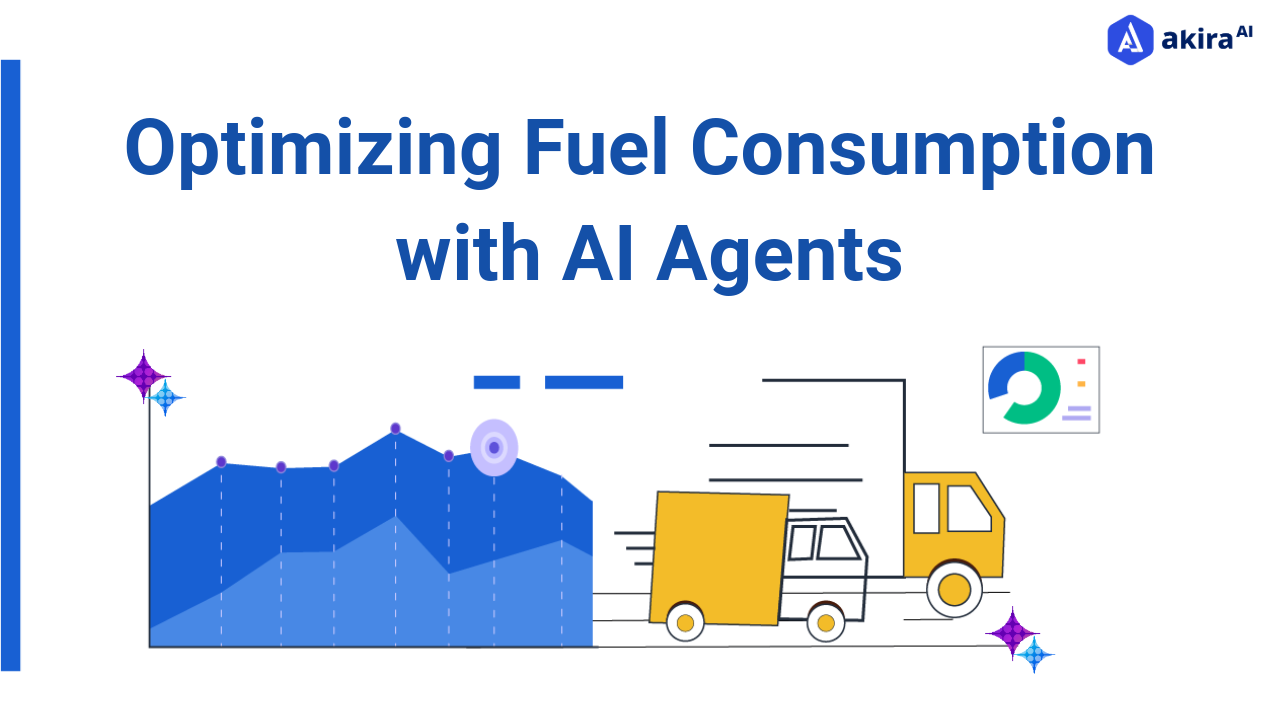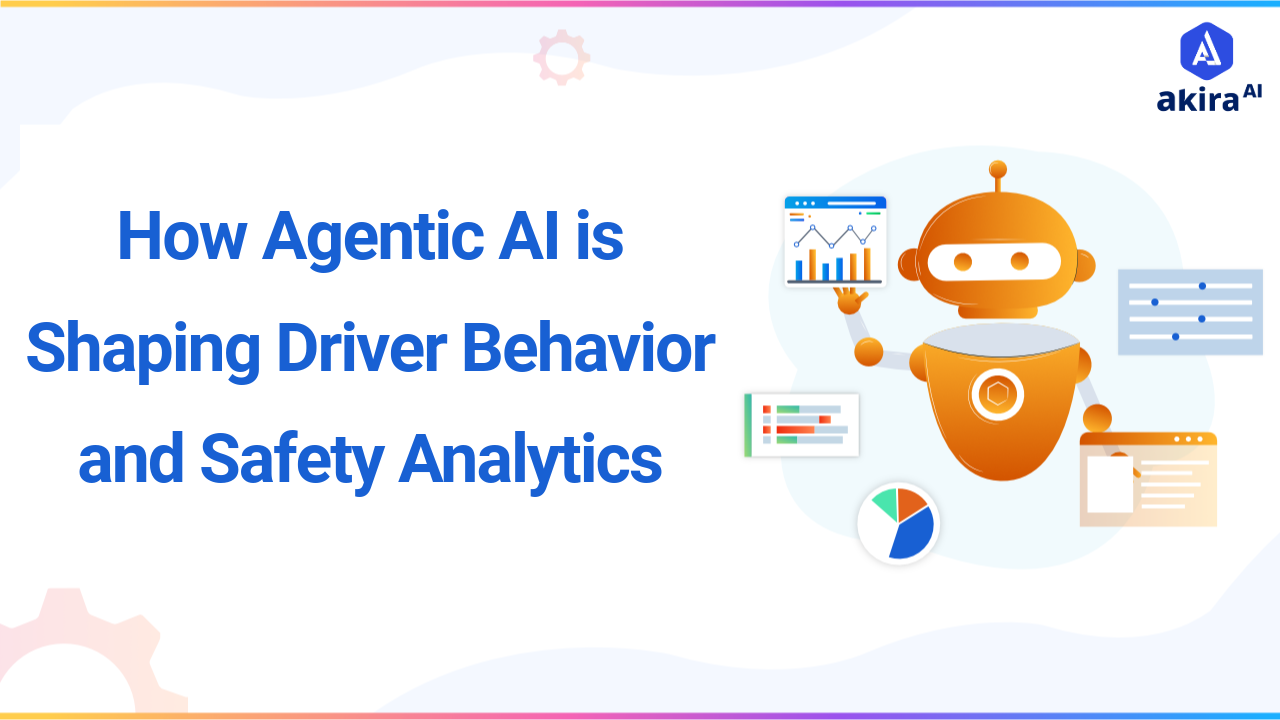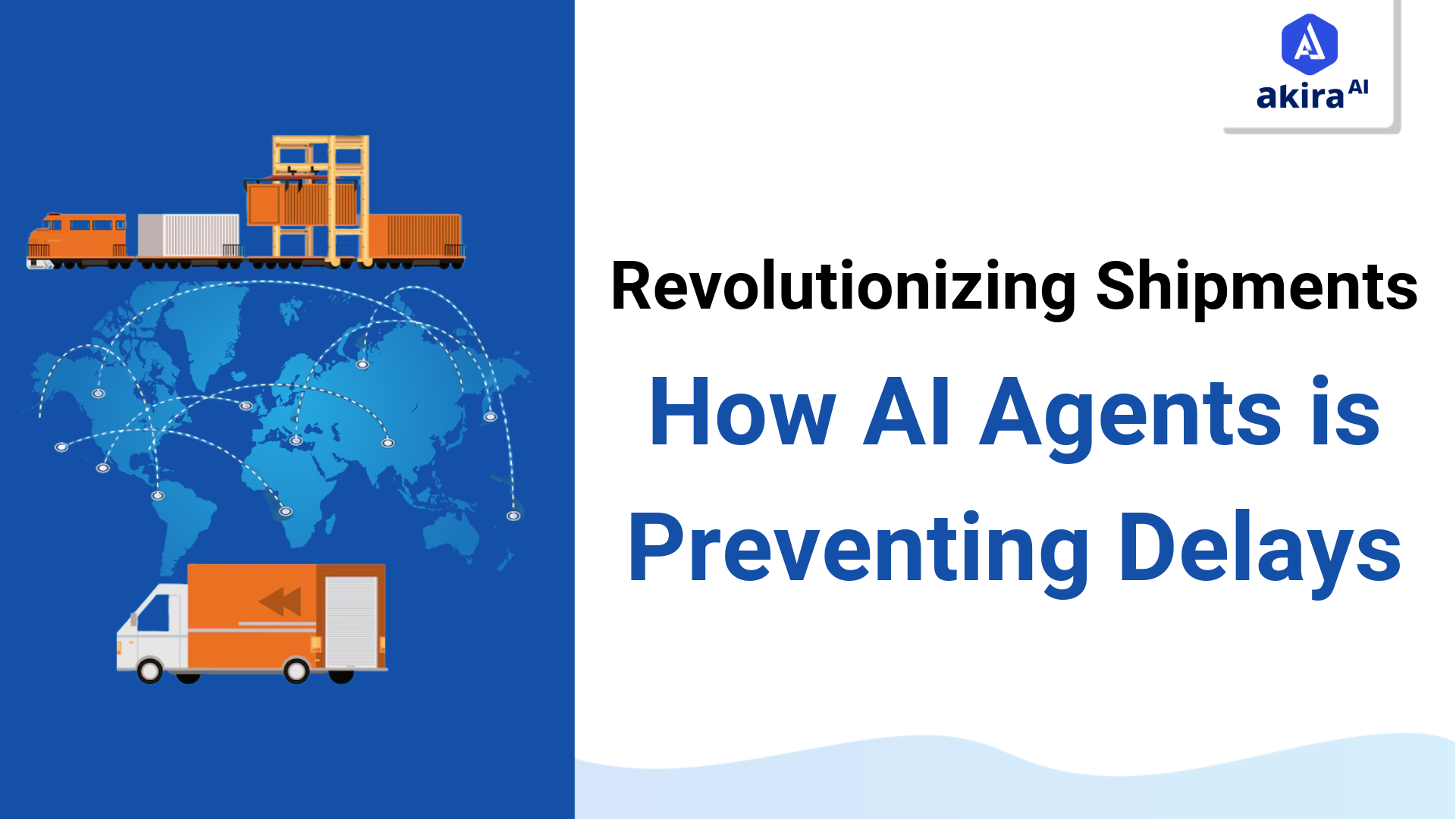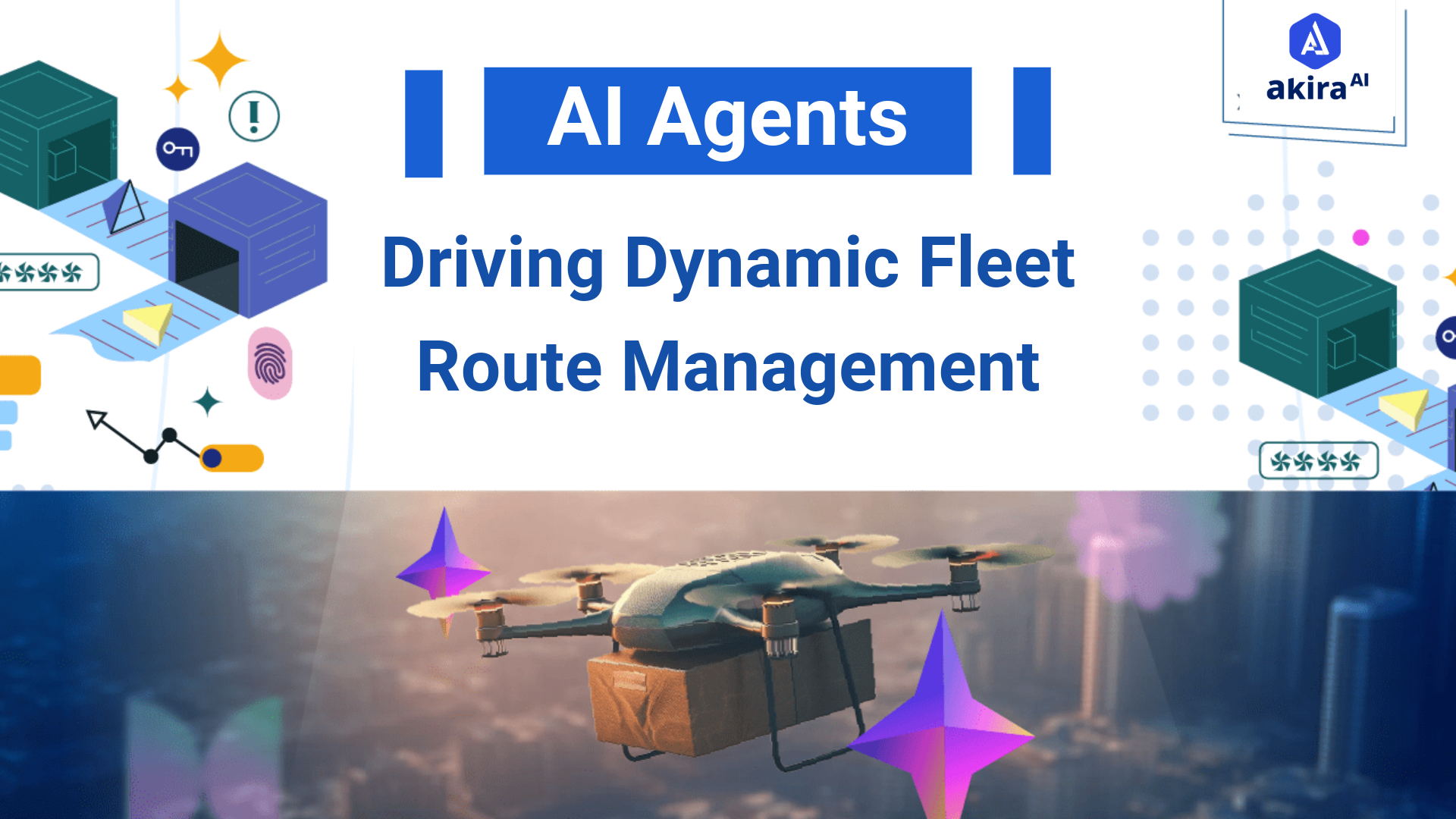Key Insights
AI agents are key players in optimizing fuel consumption within the transportation industry, utilizing sophisticated algorithms to analyze data for route optimization and vehicle performance enhancement. This leads to significant cost savings and a reduction in carbon emissions, promoting a more sustainable approach to transport operations. Companies leveraging agentic AI solutions can achieve greater efficiency and environmental stewardship.

With fuel costs climbing and sustainability taking center stage, fuel consumption optimization has become essential for transportation companies. In this context, AI agents offer a modern solution, employing advanced data analytics to enhance operational efficiency. By harnessing the power of these intelligent systems, businesses can optimize routes, improve vehicle performance, and ultimately save money while benefiting the environment. They analyze real-time data, adapt to changing conditions, and offer actionable insights that drive informed decision-making. As companies increasingly recognize the importance of sustainability, integrating these agents into their fuel management strategies can yield significant financial and ecological advantages.
What is Optimizing Fuel Consumption in Transportation?
Optimizing fuel consumption involves implementing strategies and technologies that reduce the fuel required for transportation operations. These can range from efficient routing and increasing vehicle reliability to making use of some other type of fuel. By focusing more on fuel efficiency, it is much easier for companies to save money, cut some emissions, and make the world a little better place.
At its core, fuel consumption optimization is about making informed decisions based on data. It encompasses all aspects of determining the car’s efficiency, including the behavior of the driver and various factors, such as traffic or weather conditions. The latter broad perspective enables the identification of issues and the subsequent introduction of measures, which in turn provides high returns.
A Brief Overview of Optimizing Fuel Consumption in Transportation
The efficiency of fuel consumption in a transportation system achieves the highest form of fuel usage that can be utilized. It includes conventional methodologies, such as route planning, and modern technological approaches, like artificial intelligence. As the demand for efficient logistics grows, the transportation sector is increasingly turning to data-driven methods.
AI agents play a pivotal role in this transformation. By utilizing machine learning algorithms and real-time data, these agents can analyze vast amounts of information quickly and accurately. This capability leads to better fuel use decisions that include changing the route due to traffic congestion and predicting the time that a vehicle will require for maintenance. With the help of AI, organizations will be able to fix pre-existing problems and make major improvements to their efficiency.
Traditional vs. Agentic AI Fuel Consumption
|
Feature |
Traditional Optimization |
AI-Based Optimization |
|
Data Analysis |
Manual, time-consuming processes |
Automated, real-time data analysis |
|
Predictive Maintenance |
Reactive approach to maintenance |
Proactive maintenance based on predictions |
|
Route Planning |
Static and often outdated routes |
Dynamic routing using real-time data |
|
Efficiency Improvements |
Incremental improvements |
Significant, often transformative gains |
|
Scalability |
Limited, reliant on manual adjustments |
Easily scalable across multiple fleets |
|
Adaptability to Changing Conditions |
Poor adaptability to fluctuations |
Highly adaptable with continuous AI learning |
Akira AI Multi-Agent System
In the case of Akira AI, it uses the multi-agent system to support fuel consumption optimization. It enables a level of coordination in distributed operations where each agent has its distinctive roles targeted. Here are the key agents utilized in Akira AI and their roles:
-
Route Optimization Agent: This agent operates based on information obtained about traffic conditions in real-time and provides the most efficient routes to take in relation to fuel use conditions obtained from previous data. Making modifications to routes, it can bring down traveling time and fuel consumption.
-
Maintenance Prediction Agent: This agent allows for efficient delivery of fuel as it looks at fuel usage patterns and future markets. They save costs incurred on the procurement of fuel since fuel is utilized efficiently and economically.
-
Fuel Management Agent: This agent can help in the selection of the most appropriate sources of fuel and their delivery because it assesses the usage rate and the market changes. They save costs incurred on the procurement of fuel since fuel is utilized efficiently and economically.
-
Environmental Impact Agent: This agent analyzes the environmental impact of transportation procedures, especially concerning legal requirements for environmental policies. Eco-friendly practices serve the purpose of sustainability & they must be incorporated.
-
Real-Time Monitoring Agent: Updates and monitors speed, acceleration, braking, emissions, road conditions, and traffic conditions for instant evaluation for possible corrective action.
Use Cases and Applications for Fuel Consumption Optimization in Transportation
The application of fuel consumption optimization is vast and varied across the transportation sector. Here are some compelling use cases:
-
Freight Logistics: These agents help companies optimize shipping routes, reducing fuel consumption and transit times while enhancing delivery reliability. These agents can re-direct trucks by providing traffic information on approaching traffic jams.
-
Public Transportation: Transit agencies use Artificial Intelligence technologies to schedule and determine routes to enhance fuel consumption per head. Dynamic scheduling can also improve operational effectiveness throughout the whole fleet.
-
Autonomous Vehicles: Advanced algorithms allow cars to independently determine the most efficient way of using fuel. These vehicles are capable of anticipating the movement of other cars and changing their movements to eliminate frequent acceleration and deceleration.
-
Fleet Management: Businesses leverage autonomous agents to keep track of fuel usage in several vehicles with a goal of efficiency and efficiency. The adoption of artificial intelligence by fleet managers is likely to lead to increased efficient management of fuel costs.
-
Airline Operations: Airlines use AI to optimize flight paths, minimizing fuel consumption while ensuring on-time arrivals. Airlines can achieve fuel savings by adjusting flight plans based on real-time conditions.
-
Construction and Heavy Machinery: Construction companies use AI agents to optimize fuel consumption in heavy machinery by scheduling operations during off-peak hours and adjusting equipment usage based on real-time project demands.
Operational Benefits of Optimizing Fuel Consumption
Implementation of AI agents for fuel consumption saves many operational aspects that can revolutionize transportation companies. Here are some key advantages:
-
Enhanced Efficiency: Organizations can get an additional 30% of performance enhancements through smart automation and achieve more with fewer resources. This efficiency has the effect of decreasing fuel consumption and, therefore, cutting costs and increasing profitability.
-
Data-Driven Insights: These agents include data analysis to result in suggestions that would enable businesses to make rational choices concerning fuel use and ways for improving their operations. This capability can bring about 10-15% savings on fuel costs because of sound decisions made in this regard.
-
Proactive Maintenance: Predictive maintenance capabilities lead to fewer breakdowns and unplanned downtime, enhancing fleet reliability and reducing maintenance costs. By avoiding costly repairs, organizations can save 15-20% on maintenance expenses.
-
Improved Compliance: Autonomous agents ensure adherence to environmental regulations and standards, minimizing legal risks and promoting sustainability initiatives. Companies can avoid fines and penalties, saving 5-10% on regulatory costs.
-
Scalability and Flexibility: AI systems' modular nature allows companies to scale their operations seamlessly, adapting to changing demands without significant additional investment. This flexibility can lead to long-term cost savings and increased market competitiveness.
-
Lower Fuel Procurement Costs: By optimizing fuel purchasing strategies and distribution, organizations can achieve savings of approximately 10% on fuel procurement costs. This translates into significant financial benefits over time, especially for large fleets.
Technologies Transforming Fuel Consumption Optimization
The intersection of technology and fuel consumption optimization is ripe with innovation. Here are some transformative technologies shaping this landscape:
-
Multi-agent Workflows: Enable collaboration among different AI agents, leading to more comprehensive optimization strategies that account for multiple variables simultaneously and resulting in overall efficiency gains.
-
AI Guardrails: Essential for ensuring security and compliance while utilizing AI technologies, protecting companies from potential data breaches and operational risks.
-
IoT Integration: The Internet of Things (IoT) facilitates real-time data collection from vehicles and infrastructure, enhancing the accuracy and effectiveness of AI-driven optimization strategies.
-
Blockchain Technology: Provides a secure and transparent way to track fuel consumption and carbon emissions, fostering trust and accountability among stakeholders, which can help companies avoid regulatory fines and promote sustainable practices.
Future Trends for Optimizing Fuel Consumption
The future of AI agents in optimizing fuel consumption is bright and filled with potential. Here are some key trends to watch:
-
Deeper Integration in Operations: Expect deeper integration of these agents into transportation systems, leading to smarter, more efficient operations across the industry. This integration will be important in increasing fuel economy as well as operations performance.
-
Improved Forecasting Capabilities: Enhanced capabilities for forecasting fuel needs, maintenance schedules, and operational efficiencies will drive smarter decision-making, yielding further reductions in fuel costs.
-
Expansion of Autonomous Solutions: Wider adoption of autonomous agentic AI systems in logistics and public transportation means that the conventional operations format will likely change for the better by making them safer and more fuel efficient.
-
Sustainability Initiatives: The heightened interest in environmentally friendly processes through the use of agentic AI can be expected to advance corporate initiatives on sustainability within the industry to attain greener solutions for fuel saving as well as to address issues of image and legal compliance.
-
Collaboration with Human Workers: As these agents continue to become smarter, they will complement the human worker where they are improving the job descriptions. Together, they can provide a morale boost and productivity enhancement.
-
Global Standardization: As agentic AI in transportation improves, the development of global standards will facilitate interoperability among different systems and technologies, streamlining operations and enhancing overall efficiency.
-
Enhanced Security Measures: Since these agents are dealing with sensitive data, a proper security solution is needed, especially since threats can evolve today, which means that organizations will need proper security frameworks that include AI guardrails in order to protect not only the business’ operations but its reputation as well.
Conclusion: AI Agents for Optimizing Fuel Consumption
As the transportation sector embraces AI agents for fuel consumption optimization, the potential for transformation is immense. These intelligent systems can not only significantly reduce operational costs but also support a broader commitment to environmental responsibility. Companies willing to invest in this cutting-edge technology will be well-positioned to thrive in a competitive and eco-conscious market. Moreover, leveraging agentic AI helps organizations become more adaptable and efficient, ultimately improving their overall sustainability practices. As the industry evolves, those who prioritize innovation and integrate AI into their operations will lead the charge toward a greener, more efficient future
Explore More About
Revolutionizing Shipments: How AI Agents is Preventing Delays
Autonomous Scheduling for Public Transportation with Agentic AI


